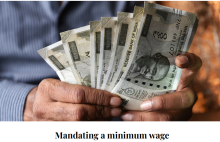Publications

|
Anitha Kurup Doctoral Research Programs in India: Bridging Policy Gaps for Knowledge Economy’s Imperative https://www.routledge.com/India-Higher-Education-Report-2023-Higher-Education-Research/Misra-Pachauri/p/book/9781032711416 Kurup, Anitha (2025) Doctoral Research Programs in India: Bridging Policy Gaps for Knowledge Economy’s Imperative. In: India Higher Education Report 2023 Higher Education Research. ed. by Pradeep Kumar Misra and Anupam Pachauri. Routledge. ISBN 9781032711 The Doctoral Program of any country is the central pillar of higher education. The conspicuous absence of a well-thought-out doctoral program in India's national research policy has resulted in asymmetries in policies and practices related to research and development. The history of doctoral research in India presents a unique trajectory with a mixed influence of the colonial past and isolated efforts of genuine intellectuals who have thrived in an environment of deep motivation and passion that defined their research pursuits. India will have to ask more profound questions regarding the quality of doctoral education and the nature of students being produced/created. How does one enhance quality, and what is the role of faculty, students, and institutions? What is the role of doctoral research in influencing learning, pedagogic practices, and curriculum in preparing a citizenry to influence growth and development at the national and global levels? While reviewing global practices and policies, this chapter attempts to draw on best practices while also addressing the opportunities and challenges that reflect the realities of developing countries, particularly India. |

|
Shruti Shankar International Schools in India and the Emergence of a New School-to-University Pipeline https://journals.sagepub.com/doi/full/10.1177/09731849251334482?trk=feed-detail_main-feed-card_feed-article-content Shankar, S. (2025). International Schools in India and the Emergence of a New School-to-University Pipeline. Contemporary Education Dialogue. This article discusses the emergence of a pipeline between international schools in India and New Private Liberal Education Universities. This development is interpreted as an elite response to the crises in higher education, providing fresh perspectives on relatively new categories of educational institutions. |

|
Supriya RoyChowdhury Mandating a Minimum Wage https://www.deccanherald.com/opinion/mandating-a-minimum-wage-3477086 Deccan Herald |

|
Supriya RoyChowdhury Women workers in Karnataka’s apparels export industry (NIAS/SSc/UMP/R/PB/03/2025) http://eprints.nias.res.in/2900/ RoyChowdhury, Supriya (2025) Women workers in Karnataka’s apparels export industry (NIAS/SSc/UMP/R/PB/03/2025). Policy Brief. NIAS, Bengaluru. |

|
Narendar Pani Land Reform as a Source of Identity Politics https://orientblackswan.com/details?id=9789354429620 In: Rob Jenkins and Louise Tillin (Eds) Deconstructing India’s Democracy: Essays in Honour of James Manor. Orient Blackswan, Hyderabad 2025 |

|
Chetan Choithani Circular male migration, rural-urban linkages and household food security in India https://www.elgaronline.com/edcollchap/book/9781802207712/chapter13.xml Choithani, C. (2025). Circular male migration, rural-urban linkages and household food security in India. In Handbook on Rural-Urban Linkages in the Global South (pp. 192-204). Edward Elgar Publishing. This chapter looks at ways in which male circular migration as a household livelihood strategy affects food access among rural households in India. Circular male labour migration is the dominant form of labour mobility in many parts of India. This migration pattern creates important rural-urban linkages through income transfers and alters within-household gender power relations. This chapter analyses the bearing of these dynamics of migration on household food security, with the larger objective of bridging the divide that currently exists between migration and food security agendas in global development research and practice. |

|
Chetan Choithani Migration, urbanization and food security in the global south: evidence from urban India (NIAS/SSc/IHD/U/RR/02/2025) http://eprints.nias.res.in/2912/ Choithani, Chetan (2025) Migration, urbanization and food security in the global south: evidence from urban India (NIAS/SSc/IHD/U/RR/02/2025). Report. NIAS, Bengaluru. |

|
Jeebanlata Salam Sustainable Development Goals and Vocational Skill Policy: India vis-a-vis Global Scenario http://eprints.nias.res.in/2920/ Salam, Jeebanlata (2025) Sustainable Development Goals and Vocational Skill Policy: India vis-a-vis Global Scenario. Journal of Educational Planning and Administration, 39 (1). pp. 23-42. |
